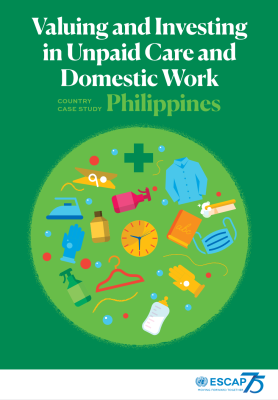Valuing and investing in unpaid care and domestic work - country case study : Philippines
This case study on the Philippines enhances ESCAP’s technical and advisory assistance to its member States, in particular aligning with the ASEAN region’s efforts to bring care to the centre of public policy. The ASEAN Comprehensive Framework on Care Economy was developed with inputs from ASEAN countries and sectoral, regional and international bodies, such as ESCAP, to ensure that a care-responsive recovery strategy leaves no one behind. The scope of care in this framework takes a broad lens towards direct and relational care work (paid and unpaid) as well as other areas needed to build back better: reskilling and upskilling employability in care sectors, embracing the digital transformation of the care economy, promoting active ageing and lifelong learning, developing the creative industry and encouraging social entrepreneurship and smart cities., This case study on Philippines enhances ESCAP’s technical and advisory assistance to its member States, in particular aligning with the ASEAN region’s efforts to bring care to the centre of public policy. The ASEAN Comprehensive Framework on Care Economy was developed with inputs from ASEAN countries and sectoral, regional and international bodies, such as ESCAP, to ensure that a care-responsive recovery strategy leaves no one behind. The scope of care in this framework takes a broad lens towards direct and relational care work (paid and unpaid) as well as other areas needed to build back better: reskilling and upskilling employability in care sectors, embracing the digital transformation of the care economy, promoting active ageing and lifelong learning, developing the creative industry and encouraging social entrepreneurship and smart cities.



